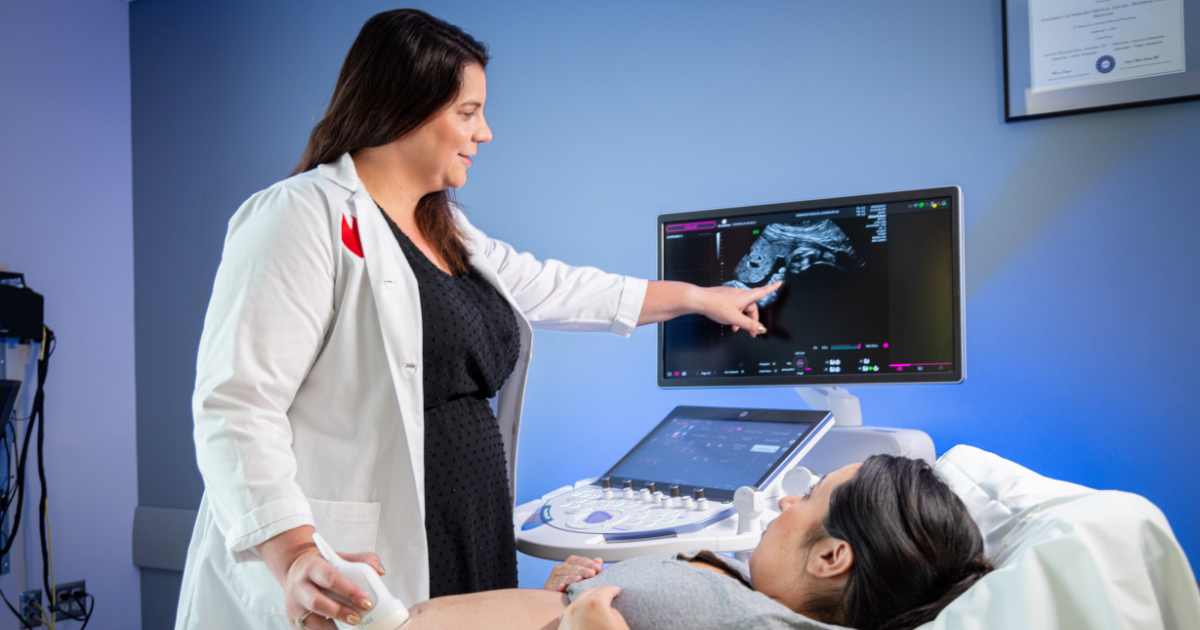How to prepare for your prenatal ultrasound

Ultrasounds are safe for you and your baby, and everyone can have them. There are many different reasons to have a prenatal ultrasound. They are often done in early pregnancy to ensure the pregnancy is in the right place and to provide the correct due date. All pregnant patients have an ultrasound to examine fetal anatomy, typically around the middle of the pregnancy.
“We also perform ultrasounds in the latter half of pregnancy to follow a baby’s growth or ensure that they’re doing well,” says maternal-fetal medicine specialist Maggie Kuhlmann, MD. “Not every patient will have the same number of ultrasounds during a pregnancy. So, don’t be alarmed if you have more or less than friends or family members.
What can I expect during my prenatal ultrasound?
What happens during your ultrasound will depend on the type of ultrasound you’re having. An ultrasound in early pregnancy or a follow-up ultrasound later in pregnancy typically takes 30 to 45 minutes. A longer ultrasound, like one to examine fetal anatomy, may take 60 to 90 minutes. An ultrasound may take longer if they find something unexpected.
Ultrasounds are performed by specialized health professionals called sonographers. Prenatal sonographers perform pregnancy ultrasounds every day, so they’re very good at it. After the ultrasound, the sonographer reviews the pictures with a physician. This is typically a maternal-fetal medicine specialist, not your regular doctor. The maternal-fetal medicine specialist will communicate the results of the ultrasound to your regular doctor.
“Laying on your back for an extended period during pregnancy can be uncomfortable,” says Dr. Kuhlmann. “If you become very uncomfortable or feel dizzy or nauseated, it’s OK to tell your sonographer you need a break.”
In some cases, the maternal-fetal medicine specialist may speak to you directly about the ultrasound. This doesn’t necessarily mean that something is wrong. They may need to clarify details of your health history. Or they may recommend a follow-up ultrasound later in the pregnancy (for example, to follow the baby’s growth).
If there’s anything concerning on your ultrasound, the physician looking at the images will typically talk to you about it right away. Otherwise, your regular doctor will review your ultrasound in more detail at your next appointment. If you have a specific question or concern, be sure to ask.
How can I prepare for my appointment?
Have your questions ready. If you have questions you know you’ll want to ask, it can be helpful to write them down before your appointment.
Wear comfortable clothes to your ultrasound appointment. Most patients don’t need to change into a gown for this type of ultrasound. It’s often easiest to wear a separate top and bottoms, as a prenatal ultrasound is performed on your bare abdomen. However, if you wear a dress, that will work too. You can also wear a watch and jewelry.
Eat whatever you want before your prenatal ultrasound. No fasting is required. You should be able to take medications as usual but ask your provider if you’re unsure.
Come with a full bladder. Depending on the type of ultrasound you’re having, you may need a full OR empty bladder. If you’re unsure, it’s best to have a full bladder just in case. Drink lots of water and don’t pee right before your appointment.
“If your ultrasound requires a full bladder, your sonographer will let you pee as soon as possible,” says Dr. Kuhlmann. “If you can’t wait, let them know, and they’ll show you to the nearest bathroom.”
Who can I bring to my ultrasound?
You can invite anyone to join you for your prenatal ultrasound. The rooms can be small, so keeping it to two or three people often works best. Visitors of any age, including children, are welcome. These exams may take some time, so consider bringing snacks or activities to keep children entertained.
In certain circumstances, the sonographer or physician reading your ultrasound may need to discuss your health history with you. If you’re uncomfortable sharing this information, keep this in mind before deciding who you’ll invite to join you.
“Our ultrasound unit does its best to stay on schedule, but we sometimes have patients with unexpected complications that take time to address,” says Dr. Kuhlmann. “If your appointment is delayed and you’re not able to wait, please let us know, and we’ll reschedule your appointment.”
Nebraska Medicine Olson Center for Women's Health has a team of maternal-fetal specialists with experience managing high-risk pregnancies. In addition to our midtown location, we recently opened a new prenatal diagnosis center at Village Pointe Health Center. Call 800.922.0000 to schedule an appointment.







